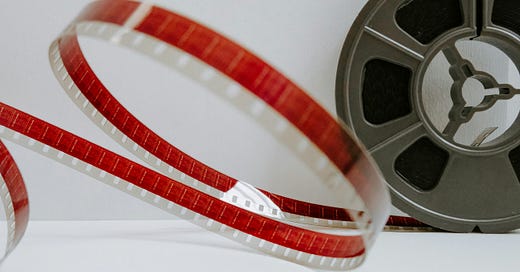One of my favorite T-shirts is from my local community movie theater. It has a picture of a nun in a habit standing behind a director’s camera and a caption above that reads, “Movies are my religion.” I’m on the second version of the same shirt, since I wore the first one out until it frayed. As a longtime Christian and former pastor, I readily affirm that “movies are my religion,” since I experience God every time I slouch slightly into a cinema chair and receive the good news—or terrible or complicated news—of that particular movie of the week. Movies are sacred. We can find God at the movies—just as we stumble upon God in life itself—if we allow ourselves to participate in a larger story. The marvelous combination of film reel, acting craft, musical score, screenwriter dialogue, and story arc, matched with a community theater (best-case scenario), can draw us out of ourselves to experience empathy, awe, grief, and enjoyment. Movies mirror life to us so that we can see life anew.
Photo by Denise Jans on Unsplash
It’s a spiritual practice for me and I try to go as often as I can. I’m fortunate enough to have the exquisite curation of my local art-house cinema to guide me to films that matter, both then and now, but I also love a trip to the multiplex with its luxury seats, surround sound, and large screen. I’ll watch anything, and this year I did, from the powerful Saoirse Ronan recovery movie “The Outrun,” to director Andrea Arnold’s latest “Bird,” to the awards favorites “Anora,” “The Brutalist,” “A Complete Unknown,” and more. I even watched “The Substance” through gaps between hands covering eyes.
Two weeks ago, I saw Nickel Boys, a poetic, experimental exploration of two boys’ friendship amid a Florida private school’s hidden horror of racism, murder, and abuse. Based on the exquisitely-told story by Colson Whitehead, I experienced this film as a contemplative meditation on suffering, memory, and beauty. It’s absolutely heartbreaking and utterly beautiful. The filmmaking is done in first person, so the viewer sees through the character’s eyes and does not immediately know what the protagonist looks like. I found it destabilizing at first, causing me to wonder what was happening, and then mesmerizing as I settled into the pain and longing of characters Elwood and Turner’s experience. Other than “Dune Part Two,” “Nickel Boys” was my favorite film of the year. (“Anora” is right up there, too. I may have been the only one in the theater laughing out loud at the slapstick comedy turn the movie takes. Sean Baker is a genius!)
Like any longstanding religion, going to the movies has its rituals. If you’re like me, the popcorn and soda fill in for Eucharistic bread and wine, or trail mix and kombucha. If I arrive early, there’s sometimes a prayerful hush during the pre-movie anticipation. Ads for the local dentist or bank might roll while I read over the printout of coming attractions. The lights darken as if calling us to worship, trailers prepare us for the main event, and we plunge into the experience for which we’re all there.
Watching movies is a contemplative practice for me because of how they change me. Movies have always stretched my imagination and consciousness and helped me grow. Watching The Normal Heart rivetted me as I learned about the AIDS crisis that took place when I was in elementary school; Almost Famous electrified me with the energy and confusion of rock and roll; Malcolm X provided a perspective of Black Power that I had never yet heard; The Bourne Identity catapulted me into the desperate thrill of finding out who you are (amid fights and car chases); I’m pretty sure the first Top Gun contained the first sex scene I saw (my friend’s parent told us to cover our eyes, but of course we didn’t); Paul Thomas Anderson’s The Master depicted the dynamics of cultic charisma and abuse; and on and on.
I also rest when I watch movies. Some call it escapism, but it’s more than that for me. The video loop of my constant thoughts pauses, and I feel my whole body relax. I’m thinking but not thinking for once, almost as if meditating. I’m experiencing how the characters’ words and decisions, enhanced by the pulsing or peaceful soundtrack, impact me.
I’m convinced, too, that movies can create empathy—for those ready to watch them with an open heart. They invite us to witness a story different from ours, like Daniel Craig’s drunk, debauched, and deeply unhappy William in “Queer.” Craig’s vulnerable and powerhouse performance chronicles the insatiable hedonistic desires of a bohemian literary type, wandering from bar to bar in Mexico City, and eventually into the Ecuadorian rainforest searching for ayahuasca. Craig’s character’s gargantuan sadness provides an invitation for empathy. The hope is that such exposure to stories creates greater inclusion and compassion in our lives. I let go of the ultimacy of my own story, I witness another, and I am more human as a result.
The religion of film can often bridge the gaps between us.
What were your favorite movies of the year? I’d love to hear.
P.S. This is updated from a 2023 post.





Very interesting side road in understanding ourselves and each other as ourselves, creatively and spiritually. Will be pondering this.
Mark, you are inspiring me to get out more. I watch Netflix while I cook, and like long series. I like Madam Secretary because people try to make government work ethically, Silo as a sci fi mind bender, Shrinking for its reflection on how to face grief, and we are officially the last people in America to be watching Ted Lasso.